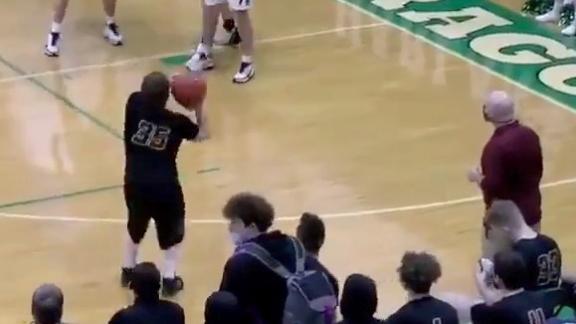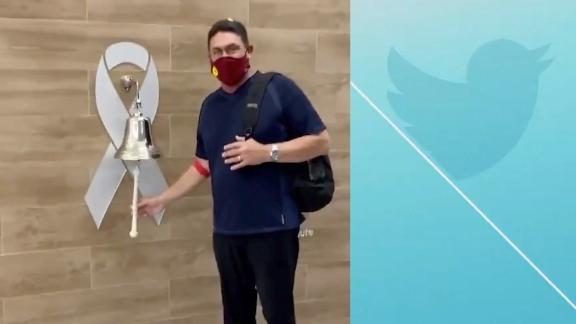Politicians love to rail against excess in election years. And with Election Day a month away, Charles Grassley, the powerful head of the Senate Finance Committee, is railing against the tax breaks afforded to big-time college programs -- setting up a possible showdown over hundreds of millions of dollars.
Grassley sent this letter to the heads of the major FBS conferences in June, asking them to document exactly how much moolah they've made in the past few years -- and how much more they stand to make with realignment.
This isn't a new crusade for Grassley. In 2008, he asked the Congressional Budget Office to look into the financing of college sports. The report he got back was eye opening. The CBO found that "when contributions are counted as commercial revenue, 73 percent of the revenue of athletic departments in Division I schools comes from commercial sources."
Got that? Nearly three quarters of all the money that athletic departments rake in is no different than the profits Nike makes selling sneakers, or Apple makes selling iPhones. The problem, as the CBO points out, is that colleges are too good at creative accounting for the IRS to ever collect on that money.
"As long as athletic departments remained a part of the larger nonprofit or public university," it wrote, "schools would have considerable opportunity to shift revenue, costs or both between their taxed and untaxed sectors, rendering efforts to tax that unrelated income largely ineffective."
In other words, our noble institutions of higher earning can't be trusted to do the right thing any more than Goldman Sachs or a weaselly hedge fund. All of which explains why Grassley seems to see realignment as a particularly epic tax dodge. His letter asked the conference heads to delay their expansion plans until they could show "how all revenues further the charitable purpose of the conference."
Of course, you know how well that worked out.
One reason the commissioners felt comfortable ignoring Grassley was that they probably suspected the same thing as sports economist Andrew Zimbalist.
"The senator saw an opportunity to score some political points and he grabbed it," says Zimbalist, a professor at Smith College.
Zimbalist doubts the crusade will have much staying power after Election Day. "At the end of the day, you don't want to be the guy in Congress known for getting in the way of America's appetite for college football," he says. "There's nothing in it for you. What there is, is a great value in appearing principled and high-minded."
(Grassley's office did not return several e-mail requests seeking comment.)
Of course, the real down-and-dirty question is how much revenue could be raised if college athletic departments lost sweetheart deals like the 80 percent tax deduction that mega-boosters like T. Boone Pickens get when they donate to schools like his favorite, Oklahoma State.
Looking at the big picture, Zimbalist agrees with the CBO: We probably won't see a dime. That's because on paper, the average athletic department loses about $10 million a year across all of its programs.
(The University of California at Berkeley provided a sobering reminder of that last month, when it announced it is cutting its baseball, men's and women's gymnastics and women's lacrosse squads, and is relegating its championship rugby team to a low-level club sport.)
But what happens if you stop talking big picture? Zimbalist says that if you focus only on the revenues that have nothing to do with academia -- like the naming rights for a football stadium, or luxury box revenue -- you get a very different picture.
Zimbalist figures that taxing just those things could yield hundreds of millions of dollars in additional tax revenue nationwide.
"The problem is that our deficit is in the trillions," says Zimbalist. "So relatively speaking, it's a small amount of money."
Yet the mere threat of forcing colleges to pay hundreds of millions of dollars in new taxes gives Grassley leverage.
The Drake Group, which promotes itself as a tool to help college "faculty and staff defend academic integrity in the face of the burgeoning college sport industry," has been lobbying the senator to make college sports more transparent with reforms like publicizing students' grades and replacing one-year scholarships with five-year ones that extend to graduation.
David Ridpath, a Drake group member who teaches sports administration at Ohio University, thinks Grassley's endgame is to win concessions in that arena.
"We think the tax issue can be used to forced colleges into more transparency," he says.
But it won't be an easy negotiation. On June 11, Pac-10 commissioner Lawrence Scott replied to Grassley with a line in the sand. Taxing athletic revenue, he wrote, will mean "many of our members would be faced with the choice of eliminating numerous sports and scholarships or increasing tuition for all students in order to continue to fund these important programs."
But nobody really thinks it's going to come to that. Not Ridpath. Not Zimbalist, who agrees "you can't just blast your way into the financial nerve center of college sports and expect not to have an effect." And certainly not conference heads like Scott, who ignored Grassley when he asked them to hold off on realignment.
This a perfect election year issue for Grassley. And if he wins re-election, it will be interesting to see how long he remains worked up about it.
File Under ...
MORE ON REALIGNMENT: Things are heating up in the WAC. The conference filed this suit against defectors Nevada and Fresno State, alleging "irreparable damage to the conference and its remaining members in that scheduling will be incomplete and participation an competition for the student athletes will be adversely affected." Since the filing the suit, commissioner Karl Benson and his membership committee have heard presentations from Texas State, UT-San Antonio, Montana, Seattle and Denver. "This is simply to gauge whether there's a potential partnership between any of the schools and the WAC," Benson said. "We are not in a sense of urgency." Then why sue?




